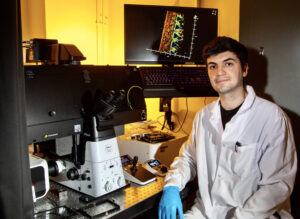
Pursuing graduate studies in microfluidics in the lab of Professors Edmond Young (MIE) and Eugenia Kumacheva (Department of Chemistry) gave alumnus Sina Kheiri (MIE PhD 2T4) more than just a degree.
His research led to a new platform that provides targeted cancer treatments with more effective results, and extended to a postdoctoral opportunity at Massachusetts Institute of Technology (MIT).
Cancer modelling typically works with spherical-shaped tumors. In his research, Kheiri identified that treatment models in different shapes and sizes can lead to more successful and targeted radiation therapy or drug delivery. He developed the Recoverable-Spheroid-on-a-Chip with Unrestricted External Shape (ReSCUE) platform to help predict cancer cell behaviour and aggressiveness, and his finding were published in a paper titled Microfluidic Platform for Generating and Releasing Patient-Derived Cancer Organoids with Diverse Shapes: Insight into Shape-Dependent Tumor Growth.
“I was fascinated by how mechanical engineering concepts and methods could be used to mimic and model biological events and human organs,” says Kheiri, who joined MIE for his PhD studies in 2019.
“This was the driving force to pursue graduate studies and focus on using engineering approaches to develop platforms at micron scales to recreate human organs.”
Kheiri’s primary research goal aimed to contribute to a deeper understanding of disease progression and develop strategies to control or eliminate cancer tumors at early stages. He says that access to U of T’s world-class engineering facilities, cutting-edge research in bioengineering, and leading Toronto hospitals advanced his research goals and methodologies.
Throughout his PhD studies, Kheiri tackled complex problems and strengthened his ability to think critically, problem-solve and embrace adaptability in research.
“For me, one of the most exciting aspects of graduate research was finding solutions to unexpected challenges,” says Kheiri.
“This meant adjusting methodologies, exploring alternative strategies, and sometimes pivoting aspects of my project to achieve the goal.”
Beyond his research studies, Kheiri credits teaching and mentoring students during his time at MIE for enhancing his leadership skills. His dedication to teaching was recognized with an MIE TA Award and he has continued to guide and support students while in his role at MIT.
“Being able to guide and support students in their academic journeys was truly fulfilling,” says Kheiri.
“One memorable experience was participating as a judge at the 2020 U of T Designathon, where I witnessed our MIE undergraduate students come together and take the initiative to organize and execute a 36-hour design sprint was an inspiration and an experience I will always cherish during my time at MIE.”
During his third year of PhD studies, Kheiri realized that he wanted to continue in academia and further his research in microfluidics for biological applications, specifically modeling vasculature in tissues. Mentorship from his supervisors Young and Kumacheva provided Kheiri with valuable insight in preparing for his plans post-PhD.
Kheiri put together a proposal for postdoctoral research and applied for the NSERC Postdoctoral Fellowship to support it. Leveraging specialized workshops hosted by U of T, Kheiri was able to refine his proposal and strengthen the application. The result: a postdoctoral research position at MIT with Professors Roger Kamm and Ritu Raman, which began a month after graduation. In this role, Sina is developing vascularized organ models using microfluidics to gain deeper insights into disease progression, with the ultimate goal of advancing human health.
Kheiri’s research connection with Young and Kumacheva has remained strong after the move to Boston.
“The team is now exploring the potential of the ReSCUE platform in advancing personalized medicine, including applications in immunotherapy screening and translational oncology, with the goal of enabling patient-specific treatment strategies.”
– This story was originally published on May 29, 2025, by Kendra Hunter.